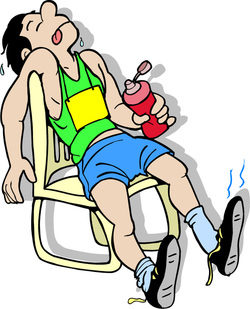
All athletes get tired. That is part of the circle of life for a competitive athlete. You wake up, workout, eat, day job, workout, eat, relax and then SLEEP. But as the routine continues day in and day out, it usually gets progressively worse.
All of it gets worse. The workouts get longer and harder. You continue to eat more and hopefully you're picking the right foods and recovery snacks. Your sleep starts getting shorter and harder. So when does the cycle end? When does your body (and mind) get used to this progression? As the fatigue builds up, you start to doubt and question your training. And hopefully, before its too late, you ask yourself one important question. Is the fatigue you are feeling normal or is it overtraining?
First, what is overtraining? Overtraining is when you have pushed your body too hard, for too long, with too little rest. Overdoing it for so long that one or two days off and decent sleep will not help. There is a reason why rest days are scheduled in your training. Even elites need rest days. These rest days allow you to wake up the next morning and perform a workout with the necessary energy (both physically and mentally). Workouts are supposed to be hard and tiresome, but overtraining is where every workout is hard and tiresome, even the slow workouts.
Fatigue on the other hand is just tiredness from the prior day or two of hard runs. After a rest day or two, you can come back and nail a quality workout. Fatigue is short term (1-3 days) whereas Overtraining is long term (2-3 weeks). Fatigue makes you tired, cranky, hungry (sometimes lack of appetite) and mentally exhusted. But the good news is, after a couple days of easy running or off days, you're right back at it.
When I schedule my training blocks, I know from past experiences every 4th week needs to be a Rest/Down week. Then I can build back up. Also, after a long hard Sunday run, I need to wait until Wednesday to do my next hard workout (as opposed to the usual Tuesday). These are all tips that I have learned to combat fatigue and avoid falling into the black hole of Overtraining.
So dont worry if you slept in yesterday and missed an easy ride or shakeout run. Every so often, thats just your body telling you to take a break. When you start missing multiple workouts, or cant hit any of your paces like your used to, then sit down and ask yourself, is the fatigue you are feeling normal or is it overtraining?
My highschool cross country coach had a great quote that has always stuck with me. "One of the most courageous things an athlete can do, is to know when to rest."
This topic is hitting home right now as I transition into my Ironman training (Ironman Boulder Aug 2014). Boston Marathon in April is still a high priority, but I know I need to incorporate swimming and cycling into my plan sonner than later. The only way to do that (that I can figure out) is to wake up early and hit the gym/pool. Being NOT an early bird (I usually only do 2x morning workouts a week). Transitioning to waking up at 5:45am 4x a week is getting to get a bit tough. I am sure I just need to get used to it and work my way through the fatigue. My body (and mind) will figure it out soon...or else overtraining will rear its ugly head.
All of it gets worse. The workouts get longer and harder. You continue to eat more and hopefully you're picking the right foods and recovery snacks. Your sleep starts getting shorter and harder. So when does the cycle end? When does your body (and mind) get used to this progression? As the fatigue builds up, you start to doubt and question your training. And hopefully, before its too late, you ask yourself one important question. Is the fatigue you are feeling normal or is it overtraining?
First, what is overtraining? Overtraining is when you have pushed your body too hard, for too long, with too little rest. Overdoing it for so long that one or two days off and decent sleep will not help. There is a reason why rest days are scheduled in your training. Even elites need rest days. These rest days allow you to wake up the next morning and perform a workout with the necessary energy (both physically and mentally). Workouts are supposed to be hard and tiresome, but overtraining is where every workout is hard and tiresome, even the slow workouts.
Fatigue on the other hand is just tiredness from the prior day or two of hard runs. After a rest day or two, you can come back and nail a quality workout. Fatigue is short term (1-3 days) whereas Overtraining is long term (2-3 weeks). Fatigue makes you tired, cranky, hungry (sometimes lack of appetite) and mentally exhusted. But the good news is, after a couple days of easy running or off days, you're right back at it.
When I schedule my training blocks, I know from past experiences every 4th week needs to be a Rest/Down week. Then I can build back up. Also, after a long hard Sunday run, I need to wait until Wednesday to do my next hard workout (as opposed to the usual Tuesday). These are all tips that I have learned to combat fatigue and avoid falling into the black hole of Overtraining.
So dont worry if you slept in yesterday and missed an easy ride or shakeout run. Every so often, thats just your body telling you to take a break. When you start missing multiple workouts, or cant hit any of your paces like your used to, then sit down and ask yourself, is the fatigue you are feeling normal or is it overtraining?
My highschool cross country coach had a great quote that has always stuck with me. "One of the most courageous things an athlete can do, is to know when to rest."
This topic is hitting home right now as I transition into my Ironman training (Ironman Boulder Aug 2014). Boston Marathon in April is still a high priority, but I know I need to incorporate swimming and cycling into my plan sonner than later. The only way to do that (that I can figure out) is to wake up early and hit the gym/pool. Being NOT an early bird (I usually only do 2x morning workouts a week). Transitioning to waking up at 5:45am 4x a week is getting to get a bit tough. I am sure I just need to get used to it and work my way through the fatigue. My body (and mind) will figure it out soon...or else overtraining will rear its ugly head.

 RSS Feed
RSS Feed
